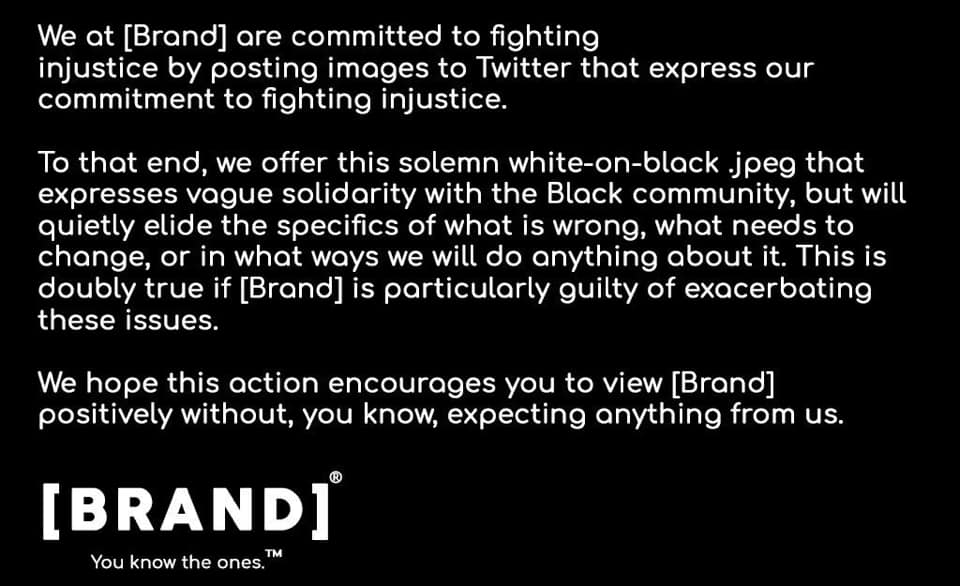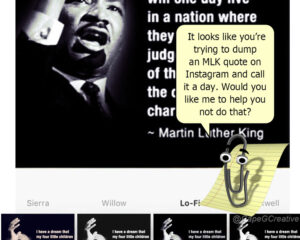
It’s been not quite two weeks since the first protest in Minneapolis after a police officer killed George Floyd while his three partners watched and did nothing. People of all races all across the world are marching to oppose police violence, often facing violent opposition from police, so… settle in, is my point.
Solidarity with and support of the black community are so important right now. They deserve someone to elevate their voices, stand with them in protest, and affirm that someone else believes their lives matter. Individuals and brands have been speaking up online, adding their messages of solidarity in support of the black people who are protesting to defeat the institutional racism that is damaging, devaluing, and taking black lives. And support is good — except when it’s bad. When it’s sincere, honest, aware, self-aware, and other-focused, it’s good. Thus this list of considerations to make sure your brand’s official statement is… all those things I just said.
Tips for not effing it up
Now, you may be asking yourself: What the does this woman know about anything?
Am I an expert in this area? Absolutely not. Mostly, I’m just a person who’s made lots and lots of bad mistakes. I’ve had the benefit of black women who took the time to set me straight even when they absolutely didn’t have to, and of black women who have given me the unequivocal telling-off I richly deserved. Both of those experiences are intensely humbling and educational. If I’m able to spare a person from repeating one of my screwups, and/or save a black person from having to deal with it, then call me a walking cautionary tale. To wit:
1. Center the people who are suffering.
It can be hard not to make it about you? A corporate or brand statement is from you, so shouldn’t it be about you and your reaction to the current situation?
Nope. Any statement you make should center the people who are suffering right now. Acknowledge what they’re going through and where it came from. The only part about you is the part where you say you support them, and what tangible form that support will take.
2. Don’t tokenize your black employees.
If any of your black employees actually do have something they want to say, give them the mic — this is a time to elevate black voices. But if you have four black employees out of fifty, don’t trot them out as an example of your commitment to diversity. (And, like, that’s actually an issue you’ll want to address anyway.) “Black lives matter” means your black employees are more than just props.
3. Remember what all of this is about.
A lot of brands are making statements talking about their commitment to diversity and multiculturalism. And those commitments are great, and in other circumstances, they might be applicable. But black people are marching in the streets right now over institutional racism and police brutality, and that’s not going to be resolved with togetherness. This is not to say that other races don’t also experience oppression — just that right now, it’s an issue that largely affects black people. Talk of multiculturalism in this situation overshadows some of the important elements of black lives mattering.
On that note, also try not to mix your messages — trying to cram #BlackLivesMatter and #LGBTPride into one comment, just ‘cause it’s June, serves neither of those communities.
4. Don’t say that all lives matter.
Nope nope nope nope nope nope.
I’m sure you mean well, but absolutely please do not say that.
(Incidentally, also don’t say that you “don’t see color.” Seeing color is actually a good thing, particularly when the issue at hand is discrimination on the basis of skin color. The important thing isn’t not seeing color but recognizing that everyone deserves equality regardless of color.)
5. Know that quoting Dr. King is actually some upper-level stuff.

Well, I should clarify: Quoting Dr. King’s “I Have a Dream” speech is the movement equivalent of Word 97 clip art. It takes no effort, and people recognize that that’s how much effort you put into it.
Martin Luther King, Jr., made some revolutionary and even incendiary statements, and finding a suitable quote for your brand’s statement takes a degree of understanding of historical context. If you have that understanding, go for it, but otherwise, maybe skip it. Your words are good enough, if you really mean them.
6. Be willing to accept culpability, if it’s there.
The price of injecting your voice into an issue as serious as race is that it leaves you vulnerable to criticisms of past problems with race. Some major companies have been called out — for instance, YouTube pledging $1 million to support social justice organizations, and then getting called out for its failure to enforce its own policies against racist and white supremacist content. Or Amazon expressing its “solidarity with the black community,” and then being called to task for their handling of employee protests of unsafe pandemic working conditions, which landed disproportionately on POC workers.
Or not having any people of color in your C-suite, or ignoring requests to diversify product offerings, or making past statements that demonstrate a lack of understanding of issues of race that. If your brand has that kind of problematic history, you have to be prepared to address it with grace and understanding — and that must include a commitment to change.
I will caution that this isn’t a time to pour out your sins and ask for penance (see number 1 above). Just have a good think and be aware of anything that might end up turning into a conversation.
7. Be sincere.
Don’t post it if you don’t mean it. Don’t post it if what you’re really trying to do is rehab your image, or increase brand awareness. Use it as an opportunity to offer what solace and solidarity you can to people who need it. If you re-read your comment and think, “This doesn’t sound like me at all,” that’s probably because it isn’t — now you get to go back and write something that is.
Bonus tip: It’s okay to not say anything.
Yes, a lot of brands are making statements, and some people are specifically calling for certain brands to make statements. It’s easy to feel like you need to be part of the conversation somehow. But if you don’t have anything substantive to contribute, or if you aren’t absolutely sure about your ability to craft a meaningful statement, it’s okay to hold off.
And if you still want to contribute, you can. Share/retweet/signal boost/etc. people whose perspectives come from experiencing the world as a black person (rather than, for instance, people writing about black people). Promote petitions and opportunities to make donations. If nothing else, you have a platform — sharing it with people who have less of one can help a lot.
You’re good people, and you want to do what’s good and helpful. (I know this because my readership is small enough at this point that I literally know all of you and know you’re good people.) And that’s good! There are going to be plenty of opportunities for it, and the world needs people who are eager to take them.
And black lives matter.
Recommended reading
Like I said, I’m not any kind of expert — I’m just a person who may or may not have made five and a half of the seven above mistakes and wants to save other people from making them. Here are resources from actual experts.
Ta-Nehisi Coates, Between the World and Me
Brittney Cooper, Eloquent Rage: A Black Feminist Discovers Her Superpower
Robin DiAngelo, White Fragility: Why It’s So Hard for White People to Talk About Racism
Ibram X. Kendi, How to Be an Antiracist
Patrisse Kahn-Cullors and Asha Bandele, When They Call You a Terrorist: A Black Lives Matter Memoir
Wesley Lowery, They Can’t Kill Us All: Ferguson, Baltimore, and a New Era in America’s Racial Justice Movement
Safiya Umoja Noble, Algorithms of Oppression: How Search Engines Reinforce Racism
Ijeoma Oluo, So You Want to Talk About Race
Beverly Daniel Tatum, Why Are All the Black Kids Sitting Together in the Cafeteria?: And Other Conversations About Race
Jesmyn Ward (ed.), The Fire This Time: A New Generation Speaks about Race

